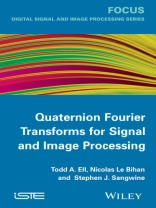Based on updates to signal and image processing technology made in
the last two decades, this text examines the most recent research
results pertaining to Quaternion Fourier Transforms. QFT is a
central component of processing color images and complex valued
signals. The book’s attention to mathematical concepts,
imaging applications, and Matlab compatibility render it an
irreplaceable resource for students, scientists, researchers, and
engineers.
Inhoudsopgave
Nomenclature ix
Preface xi
Introduction xiii
Chapter 1. Quaternion algebra 1
1.1. Definitions 1
1.2. Properties 2
1.3. Exponential and logarithm of a quaternion 7
1.3.1. Exponential of a pure quaternion 7
1.3.2. Exponential of a full quaternion 9
1.3.3. Logarithm of a quaternion 10
1.4. Representations 11
1.4.1. Polar forms 11
1.4.2. The j -pair notation 15
1.4.3. and matrix representations 17
1.5. Powers of a quaternion 18
1.6. Subfields 18
Chapter 2. Geometric applications 21
2.1. Euclidean geometry (3D and 4D) 21
2.1.1. 3D reflections 22
2.1.2. 3D rotations 22
2.1.3. 3D shears 24
2.1.4. 3D dilations 24
2.1.5. 4D reflections 25
2.1.6. 4D rotations 25
2.2. Spherical geometry 26
2.3. Projective space (3D) 28
2.3.1. Systems of linear quaternion functions 31
2.3.2. Projective transformations 33
Chapter 3. Quaternion fourier transforms 35
3.1. 1D quaternion Fourier transforms 38
3.1.1. Definitions 38
3.1.2. Basic transform pairs 40
3.1.3. Decompositions 42
3.1.4. Inter-relationships between definitions 45
3.1.5. Convolution and correlation theorems 47
3.2. 2D quaternion Fourier transforms 48
3.2.1. Definitions 48
3.2.2. Basic transform pairs 52
3.2.3. Decompositions 54
3.2.4. Inter-relationships between definitions 55
3.3. Computational aspects 57
3.3.1. Coding 57
3.3.2. Verification 62
3.3.3. Verification of transforms 62
Chapter 4. Signal and image processing 67
4.1. Generalized convolution 67
4.1.1. Classical grayscale image convolution filters 67
4.1.2. Color images as quaternion arrays 70
4.1.3. Quaternion convolution 70
4.1.4. Quaternion image spectrum 73
4.2. Generalized correlation 79
4.2.1. Classical correlation and phase correlation 81
4.2.2. Quaternion correlation 86
4.2.3. Quaternion phase correlation 88
4.3. Instantaneous phase and amplitude of complex signals 91
4.3.1. Important properties of 1D QFT of a complex signal z(t) 91
4.3.2. Hilbert transform and right-sided quaternion spectrum 96
4.3.3. The quaternion signal associated with a complex signal 98
4.3.4. Instantaneous amplitude and phase 101
4.3.5. The instantaneous frequency of a complex signal 102
4.3.6. Examples 104
4.3.7. The quaternion Wigner-Ville distribution of a complex signal 109
4.3.8. Time marginal 113
4.3.9. The mean frequency formula 113
Bibliography 117
Index 123
Over de auteur
Todd A. Ell, Engineering Fellow, Goodrich Sensors and Integrated Systems, Burnsville, MN, USA.
Nicolas Le Bihan, Researcher, CNRS, Grenoble, France.
Stephen J. Sangwine, Senior Lecturer, University of Essex, United Kingdom.












